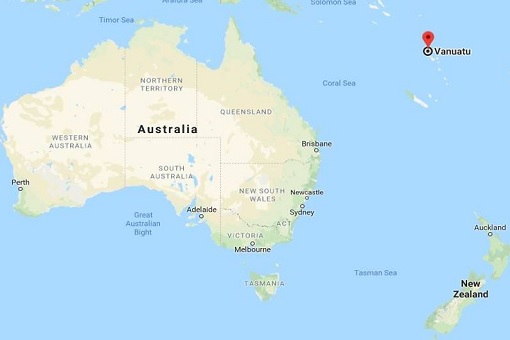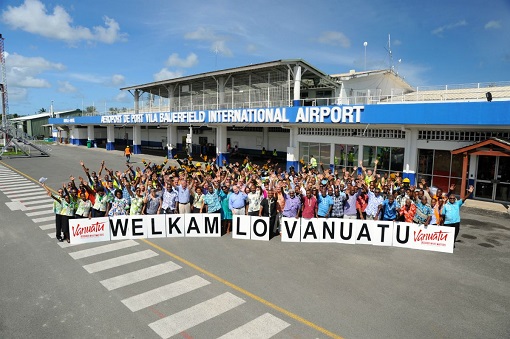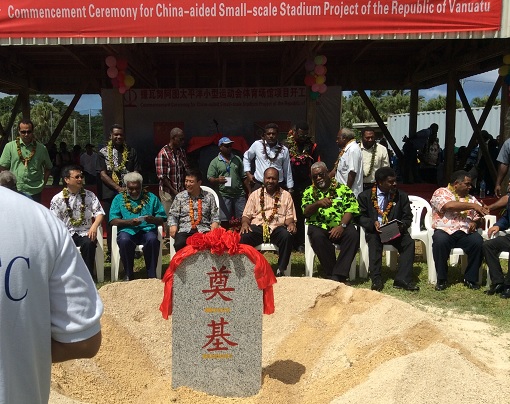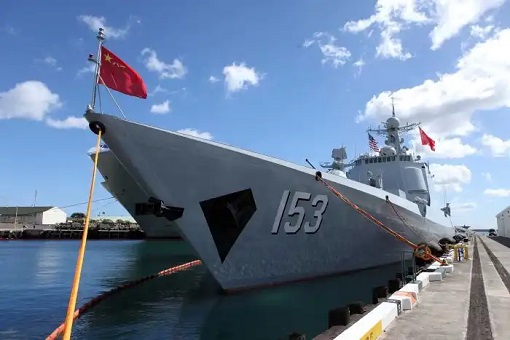China currently has just one overseas military base – in the African country of Djibouti. In comparison, United States has 38 “named bases” while maintaining 800 military bases in more than 70 countries and territories abroad. But soon, China might have its second overseas military base, if the plan goes according to the scripts.
As the Middle Kingdom’s economy continues growing, so does its military expansion. So when Australia’s Fairfax Media reported that China has approached Vanuatu about establishing a permanent military presence on the tiny Pacific island, it immediately raises concern among Australians and Americans. If materializes, Vanuatu will be China’s first military base in the Pacific.
Fairfax Media reported that talks between China and Vanuatu are in the preliminary stages, but could culminate in a permanent military presence in Australia’s backyard. Vanuatu is less than 2,000 kilometres from Australia and is one of few countries that have backed China’s position on the disputed South China Sea.

The prospect of a Chinese military outpost so close to Australia has been discussed at the highest levels in Canberra and Washington, suggesting that both countries were panicked about the growing influence of the Chinese in the region. Australian Foreign Minister Julie Bishop tried to calm the situation, saying that Vanuatu officials told her there was no formal proposal – yet.
However, despite the assurance from the Australian government, there was no denial that the “preliminary discussions” between China and Vanuatu involved an initial access agreement, under which Chinese naval ships would dock to be serviced, refuelled and restocked. That would eventually lead to a full military base – the nightmare Australia and the U.S. try to prevent.
A base less than 2,000 kilometres from the Australian coast is absolutely a threat to the national security. It would allow China to project military power into the Pacific Ocean and change the landscape of long-standing strategic balance in the region. It could also potentially increase the risk of confrontation between China and the United States.

Ms Bishop deliberately made a trip to Papua New Guinea and Tonga last month to remind the Pacific nations that Australia’s neighbours are its biggest beneficiaries of aid. In reality, however, Australia’s foreign aid spending has taken a hit as revealed in its Budget last year. The nation’s overseas assistance has been frozen for a 24-month period effective 2018 – knocking off as much as $300 million.
China, on the other hand, has contributed more than US$2.3 billion in aid to the Pacific countries since 2006. But Australia wasn’t amused with the Chinese generosity. Increasingly worried by China’s growing presence in the Pacific, the Australian International Development Minister Concetta Fierravanti-Wells had accused Beijing of funding useless infrastructure projects in the Pacific.
Beijing rubbished Canberra’s wild accusation, saying – “We hope that certain people in Australia should engage in self-reflection instead of pointing fingers at and making irresponsible remarks on other countries.” Thanks to China’s deep pocket, Fiji, for example, has been drawing closer to the Middle Kingdom in recent years.

Papua New Guinea – the Pacific’s largest economy – has signed a series of infrastructure deals as part of Beijing’s OBOR (One Belt One Road) initiative. Australia, an ally of America, has seen its regional role being challenged by the rise of China. And in time like this where the Australian investment has stagnated, the Chinese continues to pump money to the Pacific.
A staggering US$632 million of Chinese aid has gone to Papua New Guinea. Fiji received US$360 million while Samoa was flushed with US$230 million. Tonga was given US$172 million and Cook Islands received US$50 million. Vanuatu itself has gotten US$243 million from China.
Vanuatu, a Pacific country which has a population of about 270,000, is a good target for Beijing due to its strategic location. Already, China reportedly accounts for nearly half of Vanuatu’s US$440 million foreign debt. Last week, Beijing said it would pay for and build a new official residence for Vanuatu Prime Minister Charlot Salwai.

Together with a new Finance Ministry building and an extension on the Foreign Ministry building, the Chinese would be spending US$36 million for Vanuatu. Early last year, Beijing donated 14 military vehicles to Vanuatu. Meanwhile, Chinese contractors are putting the finishing touches on a US$14 million school that will be the biggest education facility in the South Pacific.
But one of the most substantial projects funded by Chinese money is Luganville wharf on the north island of Espiritu Santo. The wharf is close to an international airport that China is helping Vanuatu upgrade. Beijing says the purpose of the wharf is to host cruise ships. But it also has the potential to service naval vessels as well.
The U.S. and Australia were deeply concerned that China’s military base in Djibouti, which features a port, helicopter base, hangars and accommodation for up to 10,000 troops, could be replicated to Vanuatu. And there could be not only one but more of such bases in the Pacific, therefore, provides China the ability to challenge American influence.

China is extremely efficient and brilliant in scooping “debt-for-equity” foreign assets. The game is to build mega infrastructures for weak countries hungry for investment, countries which Fortune 500 would not touch with a ten-foot pole. Beijing provides loans but the money would most often than not go to Chinese companies while the country is saddled with huge debt.
For US$1.12 billion, China has taken control of a strategic port in Sri Lanka – for 99 years. Like Vanuatu’s Luganville wharf, Sri Lanka’s Hambantota port sits in a very strategic location – just a few miles north of the vital Indian Ocean shipping lane over which more than 80% of China’s imported oil travels. As its second “base outside of China” – Vanuatu would grow and expand China’s influence into the Pacific.
Other Articles That May Interest You …
- Chinese Flag Raised At Sri Lanka Port Raises Concern Of China Secret Naval Base
- Forget South China Sea, China Is Dominating Indian Ocean – And India Isn’t Happy
- Watch Out US, Japan, India – China Launches Asia’s Biggest Type 055 Destroyer
- Here’s How China Hurts U.S. – Boycotts All South Korean Products1
- India Boycotts $100 Billion OBOR – Sees Through China’s Territorial Ambitions
- Declaration Of War! – U.S. Military Wants Control Over Ports In China & Russia
- Bandar Malaysia Has Become “Bandar China” – The U.S. & Malays Conned By Najib
- “War Message” To Japan And US!! – China Sends 40 Fighter Jets & Bombers To Okinawa

|
|
April 10th, 2018 by financetwitter
|


|

|

|

|

|

|




























Comments
Add your comment now.
Leave a Reply